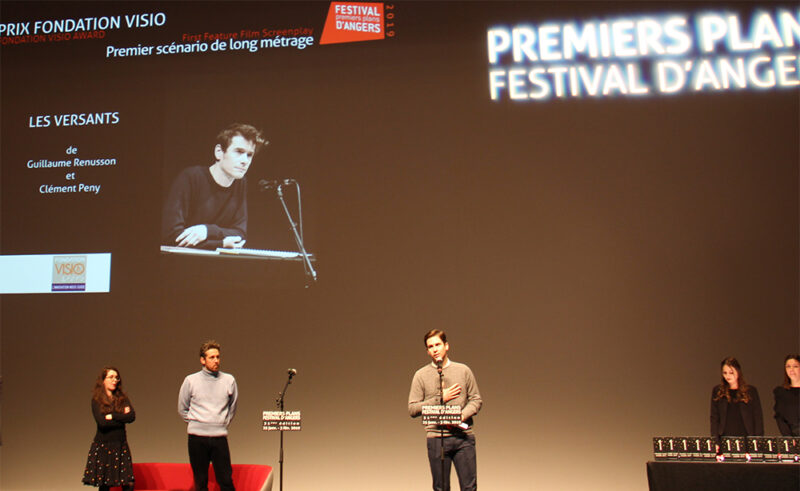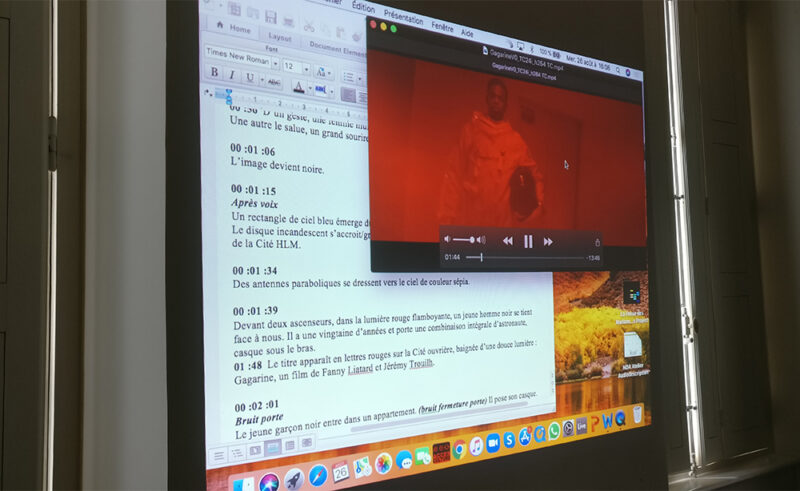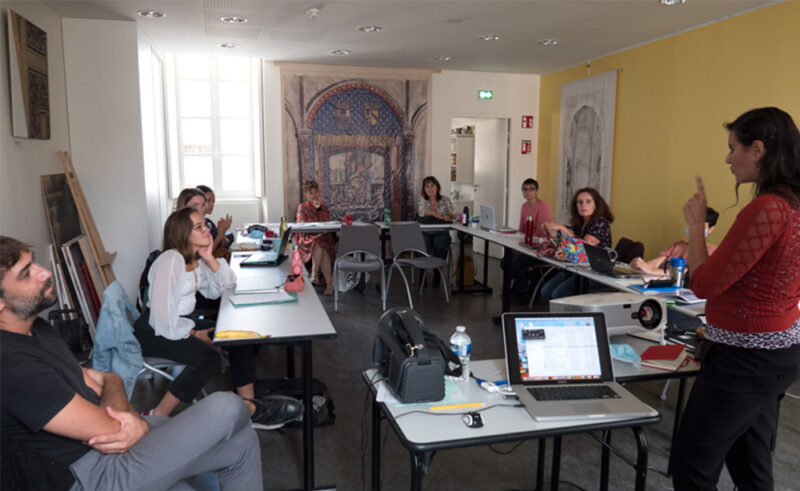What is a movie audio description ?
This technical process, dedicated to the description of the movie, consists in designing and inserting a voice-over text on the initial soundtrack. This text describes the major visual and sound elements of the work. The spectator has access to it if he wishes.
This description is inserted between the dialogue scenes and the background sounds (music, ambient), and it is of great importance for all those who love cinema but have lost their sight. And this is a substantial portion of the population.
An exhaustive audio description is certainly not a good option, as it can drown useful information in a multitude of irrelevant details, becoming “indigestible” for the visually impaired public. Selecting the visual elements to describe, knowing how to use the right words, taking care to stay true to the direction of the filmmaker are therefore essential tasks that rely on the skill of a true professional.
What are the actions carried out by the VISIO Foundation?
100 films from French cinematographic heritage 100% accessible
This important cultural project brings together the VISIO Foundation and Les Yeux Dits, association behind the project, around the creation of a collection of 100 masterpieces and great classics of French cinema that are totally accessible to people with visual and hearing impairments. The collection is entirely audio described and subtitled.
Selected by Alain Bergala – film director, and cinema critic and historian, the accessible version of these films will be available free of charge on the catalogues of the two on demand platforms for cinephiles that are co-partners of the project: the Médiathèque Numérique (managed by Arte) and La Cinetek (founded by film directors).
The collection will be officially launched in the autumnof 2022 with its 25 first accessible films :
- Adieu Philippine, from Jacques Rozier
- Baisers volés, from François Truffaut
- Boudu sauvé des eaux, from Jean Renoir
- Chronique d’un été, from Jean Rouch et Edgar Morin
- Cléo de 5 à 7, from Agnès Varda
- Être et avoir, from Nicolas Philibert
- Le Mépris, from Jean-Luc Godard
- Les Valseuses, from Bertrand Blier
- Van Gogh, from Maurice Pialat
- Sobibor, from Claude Lanzmann
- Lola, from Jacques Demy
- La guerre des boutons, from Yves Robert
- Feu Follet, from Louis Malle
- Le plaisir, from Max Ophüls
- Pierrot le fou, from Jean-Luc Godard
- Les yeux sans visage, from Georges Franju
- Les roseaux sauvages, from André Téchiné
- Plein Soleil, from René Clément
- Tomboy, from Céline Sciamma
- Casque d’or, from Jacques Becker
- Ponette, from Jacques Doillon
- Sans toit ni loi, from Agnès Varda
- Les demoiselles from Rochefort de Jacques Demy
- Peau d’Âne, from Jacques Demy
- Les enfants du paradis, from Michel Carné
Raising awareness among young directors at the Premiers Plans Film Festival

The “VISIO Foundation for Audio Description” jury, the first French cinematic jury composed exclusively of blind and visually impaired people, was created in 2017 in close collaboration with the team of the Premiers Plans Film Festival in Angers.
During this festival, which is devoted to first films from European directors and to reveal young filmmaking talent, this jury meets young directors and awards the first feature film script of one of them. A financial contribution is awarded to the winner by the Foundation so they can audio-describe their first film.
Rewards were already given to the following young directors :
- Elsa AMIEL for « Pearl »
- Filippo MENEGHETTI for « Deux » – César 2021 of first best film
- Raphaël PFEIFFER for « L’œil du tigre »
- Guillaume RENUSSON for « Les survivants »
- Fanny LIATARD and Jérémy TROUILH for « Gagarine » – Cannes 2020 Official Selection
- Vincent MUNIER and Marie AMIGUET for « La Panthère des neiges » – César 2022 for best documentary film
- Jean-Baptiste DURAND for « Chien de la casse »
The festival provides the perfect space where a visually impaired audience and young directors come together in the name of a common passion, the cinema, and an essential need, the accessibility to films.
The overall commitment of the VISIO Foundation in the development of audio description supports the enhancement and recognition of this technical device as a process of cultural inclusion in its own right extending the initial work, and as a means of sharing works between all audiences.
Introduction to audio description workshops
“This program is available in audio description”. What does this sentence that everyone hears or reads on their television screen actually mean?
To understand and go behind the scenes of audio description, the VISIO Foundation organizes, with its partners and under the direction of the professional audio-descriptor Dune Cherville, workshops to raise awareness and to uncover audio description. These workshops are designed according to the audiences they are intended for.

Festival Premiers Plans – Workshops open to the public
This annual workshop (8 to 10 participants maximum), organized around a short film, has the main objectives of:
- informing about the essential principles of audio description,
- making the participant dive into the sensory universe of the blind and visually impaired,
- questioning the perception and construction of images for the visually impaired,
- raising awareness about the writing of audio description,
- sharing the writing of an audio description as a part of a collective project
- demonstrating the importance of audio description for visually impaired people.
The audio described short film is then screened for a special public and is free of charge. This happens during the Premiers Plans Film Festival, followed by discussions with the director, the visually impaired spectators and the audio-descriptor.
LA FEMIS – Raising awareness among film students
Developed in close collaboration with the team of the Premiers Plans Film Festival in Angers, this workshop is designed for film students, in particular those from the prestigious FEMIS film school, who are planning to work as cinema operators or distributors.
Tailor-made workshops

Organization of personalized workshops for various audiences upon request (e.g. tourism professionals).